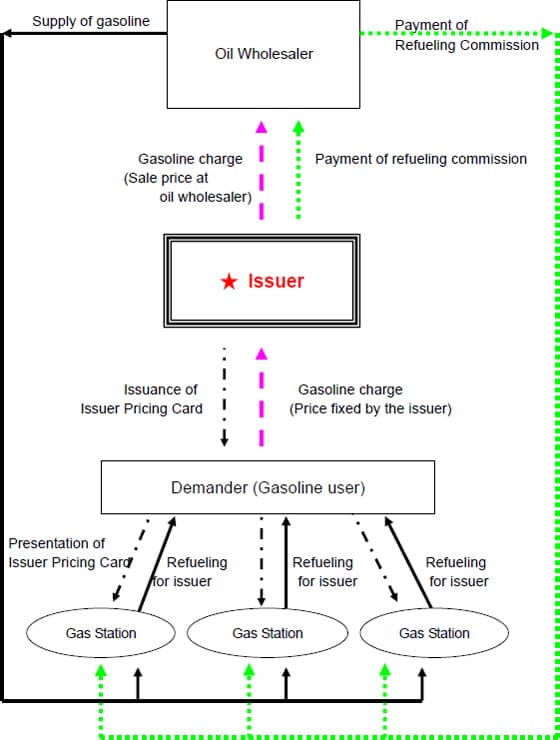October 3/2008
Japan Fair Trade Commission
The Japan Fair Trade Commission (JFTC) has investigated Nippon Oil Corporation (hereinafter referred to as “Nippon Oil”) for the following concerns about the card called “Issuer Pricing Cards” (hereinafter referred to as “Issuer Pricing Card”) in accordance with the Antimonopoly Act: (1) Nippon Oil was suspected of selling gasoline to issuers of the card, such as affiliates of car leasing companies, at a sale price remarkably lower than that for other customers of Nippon Oil (Suspected violation against Article 19 of the Antimonopoly Act (Paragraph 3 [Discriminatory Consideration] of the Designation of Unfair Trade Practices); and (2) Under the situation that the refueling commission payable to other entrepreneurs that performed refueling to Issuer Pricing Card users on behalf of the issuer was uniquely fixed for all over Japan, some entrepreneurs running gas stations might be forced to refuel the vehicles for the above card users although they did not want to do so, which might unjustly cause disadvantage (suspected violation against Article 19 of the Antimonopoly Act (Paragraph 14 [Abuse of Dominant Bargaining Position] of the Designation of Unfair Trade Practices)). However, the JFTC now decides to terminate the investigation.
Outline of this issue is as follows:
1. Outline
(1) Mechanism of the Issuer Pricing Card (Refer to the attached sheet for schematic diagram of the refueling and settlement mechanism)
a. The Issuer Pricing Card is used in a system where the payment incurred by sale of gasoline to users is settled by the card of Nippon Oil (hereinafter referred to “Card System”). At any gas station all over Japan that is a member of the Card System, a user can have refueling at the sale price fixed by the card issuer by presenting the Issuer Pricing Card.
In addition to the Issuer Pricing Card, this Card System also covers other cards such as those for settlement at the price fixed by the applicable gas station. To make cards usable for the sale of gasoline at their gas stations, entrepreneurs must participate in the Card System so that all cards including the Issuer Pricing Cards collectively become available (hereinafter referred to as “Collective Participation Method”).
b. In refueling using the Issuer Pricing Card, the issuer is the seller of the gasoline, and gas stations run by other entrepreneurs perform refueling on its behalf upon presentation of the card. The issuer pays the refueling commission corresponding to the refueled amount to the entrepreneurs that performed refueling on its behalf via the oil wholesaler. In addition, the refueling commission is fixed by Nippon Oil for all over Japan.
c. Nippon Oil approves entrepreneurs running gas stations and those specialized in the wholesale of gasoline as the issuers of the Issuer Pricing Cards. In addition, it approves the cards issued by affiliates of car leasing companies as the Issuer Pricing Cards of Nippon Oil.
(2) Difference in sale prices of Nippon Oil
a. It was suspected that Nippon Oil sold gasoline to the issuers of Issuer Pricing Cards, such as affiliates of car leasing companies, at a price remarkably lower than that for other customers (Suspected violation against Article 19 of the Antimonopoly Act (Paragraph 3 [Discriminatory Consideration] of the Designation of Unfair Trade Practices)) and the
JFTC had the investigation.
b. It was found in the investigation that the sale price by Nippon Oil for the issuers of Issuer Pricing Cards, such as affiliates of car leasing companies,was not comfirmed to be discriminatory when compared with the price for other customers considering the difference in total sales amount,transaction conditions and transaction contents. At present, any fact in violation of the provision of the Antimonopoly Act was not found.
(3) Disadvantage for other entrepreneurs caused by refueling on behalf of issuers upon use of Issuer Pricing Cards
a. Nippon Oil's Card System adopted a Collective Participation Method and the refueling commission payable to the entrepreneurs running gas stations at the use of the Issuer Pricing Card was fixed for all over Japan.
It was suspected that some entrepreneurs running gas stations might be forced to perform refueling for users having the above cards for the refueling commission fixed by Nippon Oil although they did not want to do so on behalf of the issuer upon presentation of the Issuer Pricing Cards and were unjustly given disadvantage (Suspected violation against Article 19 of the Antimonopoly Act (Paragraph 14 [Abuse of Dominant Bargaining Position] of the Designation of Unfair Trade Practices)) and the JFTC had the investigation.
b. In the course of investigation, the JFTC pointed out the problem about the Card System to Nippon Oil. Then, Nippon Oil notified the JFTC that it would change the Collective Participation Method for the Card System and would have entrepreneurs running gas stations choose whether or not to accept the Issuer Pricing Card. According to the notification, entrepreneurs running gas stations will,when they participate in the Card System, be able to arbitrarily determine whether or not to accept the Issuer Pricing Card in the future. It can be evaluated that they will have a broader option.
2. Response of the JFTC
Considering 1 above, the JFTC confirms that there is no necessity to continue the investigation at present and decides to terminate it.
From the viewpoint of promoting fair and free competition, the JFTC will continuously pay attention to the system related to the Issuer Pricing Card of Nippon Oil and its operation situations.
Attached Sheet
Refueling and Settlement Mechanism Related to the Issuer Pricing Card
*Shown below is an example where the user uses an Issuer Pricing Card issued by an issuer to have gasoline refueling at a gas station run by another entrepreneur.

*Every announcement is tentative translation. Please refer to the original text written in Japanese.






